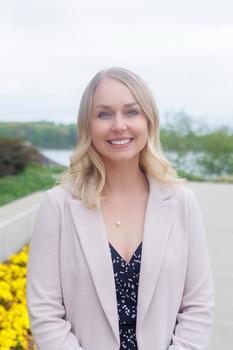The Learning Laboratory for Community Health at George Mason University held the first in-person Learning Lab Challenge at the Inaugural Empowered Communities Conference. For the challenge, graduate research assistants (GRAs) were tasked with developing an intervention that addressed the very real public health issue of opioid use disorder among adolescents and young adults.
Over the semester, GRAs worked in interdisciplinary teams, with community stakeholders providing insights into their research process and conducting interviews with affected youth and families to determine how to best meet the community's health needs.

“We were excited to showcase student milestones achieved, challenges overcome, and collective triumphs that define our community journey toward a healthier, more equitable future,” said Ashley Wiest, a research faculty member in the College of Public Health and the Learning Lab project coordinator.
The challenge concluded with GRAs presenting their interventions to a panel of experts, who evaluated and selected the intervention that will be implemented at the Mason and Partners (MAP) clinics. The experts included
- Kadhambari Sridhar, Community Preparedness Coordinator at the Fairfax County Health Department;
- Jennifer Felts, Population Health Epidemiologist specializing in substance use and mental health; and
- Shannyn Snyder, an adjunct faculty in the Department of Global and Community renowned for her expertise in socioeconomic disparities and social justice issues.
Under the guidance of Lisa Gring-Pemble, an associate professor in the Costello College of Business, the winning intervention, titled "Club Culmore: A Place-Based Wellness Model for Adolescents and Young Adults," was designed by three GRAs:
- Shams Hadi Al Jassar, biology major and pre-medical student
- Olivia Hutton, Master of Health Administration student
- Eyesha Shaikh, Master of Social Work student

|

|

|
Club Culmore presents a comprehensive seven-step approach to wellness. From mental health services to tailored social media campaigns, workforce skill development, and a dedicated medication-assisted treatment (MAT) clinic, this innovative proposal promises to address the opioid epidemic through community collaboration and tailored services for at-risk youth.
“It was rewarding to celebrate the transformative impact our Mason students have had on the landscape of community health. Their dedication, resilience, and unwavering commitment to excellence have enhanced their individual growth and enriched our community,” said Wiest.
The Learning Lab was created with support from a $1 million Health Services Research grant, made possible by Congressman Gerry Connolly of Virginia's 11th District, who shepherded the proposal through Congress. Rebecca Sutter serves as the grant's project director and principle investigator. The mission of the Learning Laboratory is to support multidisciplinary training for public health students and professionals, with special attention to marginalized communities within Northern Virginia.
The Learning Lab’s impact on students and the community
Since its inception, the Learning Laboratory has been highly successful. In the second year of the lab, students reported the lab
-
increased their knowledge of community stakeholders,
-
increased confidence in discussing core public health topics, and
-
significantly improved their critical thinking skills related to community health, networking and research, problem-solving, and professional development.
“The Learning Lab is dedicated to equipping students with the multifaceted skills essential for success in the workforce after graduation. Our teaching models foster proficiency in research, interviewing, data collection, administrative tasks, and community resource utilization alongside technological competencies, thus nurturing a generation of adept community health professionals,” said Wiest.
In This Story

Related Stories
- November 5, 2025
- October 10, 2025
- May 2, 2025
- January 31, 2025
- June 6, 2024
